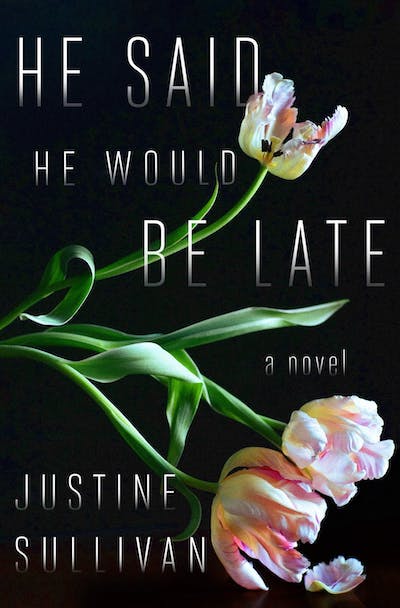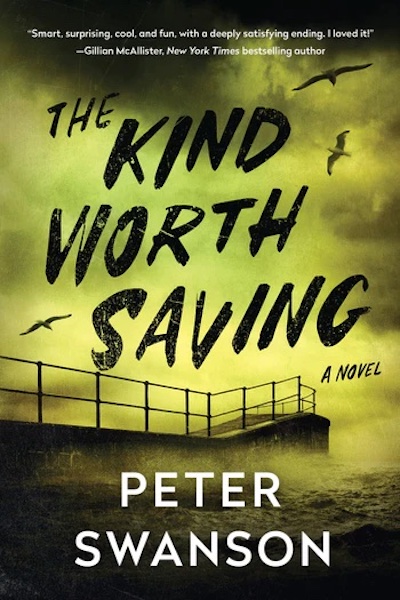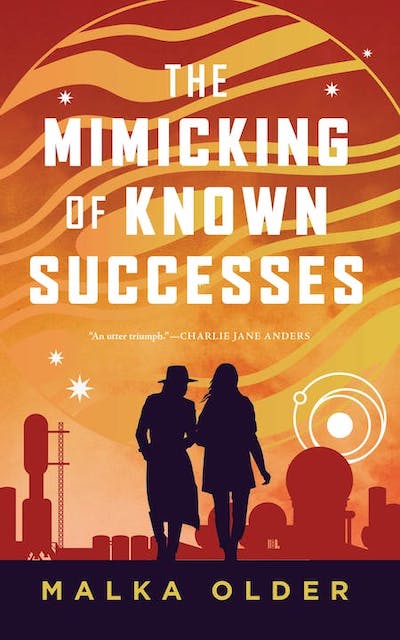This is an espionage story with a difference, featuring not a dashing ladies’ man but a young CIA operative, Melvina Donleavy, who knows her bureaucracy and sticks to it, offering an interesting look at modern-day tradecraft. Mel appears to her CIA colleagues to have no special skills, but when she’s in danger, top levels of government get involved. Readers are in on the picture, learning from the get-go that Mel has lifelong recall of every face she sees. It freaked out a middle-school crush when she mentioned having seen him at a sports event that had thousands in attendance, but when she’s sent to Byelorussia in 1990 to see if particular Iranian nuclear scientists can be spotted it’s a handy talent indeed. Mel and her colleagues are undercover, the others posing as accountants who are sent ahead of a U.S. donation to make sure none of it is earmarked for nuclear activity, she as their secretary. The stultifying Soviet observation machine moves into place, with the spies watched everywhere they go and a rigid air of we-know-you’re-spies-and-we-know-that-you-know-we-know coming off their hosts in waves. The group soon hears that a serial killer, the Svisloch Dushitel, or Svisloch Strangler, is at work in Minsk, but as its illegal to even mention the crime of serial killing, Mel has her work cut out to get to the bottom of it. Espionage, a love story, and murder mystery, all by a Department of Defense contractor assigned to the former Soviet Union in the ‘90s? Yes, please.
Review
Ready for a psychological game? Liz Bennett wasn’t, but that’s what her marriage has turned out to be—but is the game a one-sided figment of her imagination, or is her husband, Arno, an adulterer who’s playing her along? The backdrop to the maybe game is deep unhappiness and insecurity on Liz’s part. She and Arno are new parents, and motherhood is more difficult than she imagined. It’s not very enjoyable, with baby Emma looking at her “like she’s an elderly spinster I’m grooming for her banking information,” and no time or energy to write a follow-up to her semi-successful first novel. At least she has Arno, who’s worried about his wife’s happiness and shows love and support for her at every turn—a steadfast situation that she’s terrified to lose after she sees a text to him from an attractive coworker, a message that could signify a romance. Liz is soon spiraling into an abyss of fear and suspicion, one that’s incredible enough to keep readers turning the pages but believable enough to elicit real empathy for this broken soul. Sullivan has a way with characters, using dialog and Liz’s astute, cutting observations to bring Arno, crunchy-granola nanny Kyle, and bitchy-perfect sister-in-law Rose (“I’ve been up since 4 a.m.”) to gossip-worthy life. Fans of women’s fiction will eat this up.
Expecting a cozy retreat the likes of MacDowell or Yaddo, with the residents being slowly and genteelly knocked off? Then look elsewhere. This intimate retreat is the brain child of the renowned feminist horror writer Roza Vallo, who invites a handful of women under 30 to a month at her Victorian mansion in upstate New York. The women are all fierce Roza devotees, especially our narrator, Alex, who’s hoping the experience will help her push past a yearlong writers’ block. No sooner do they all gather for their first dinner than Roza starts revealing her crazy cards: the cohort will have to turn in 12 pages a day; read each other’s work; participate in group workshops; meet regularly with herself, Roza; and complete a novel by the end of the month. Whew! But best of all, at month’s end, a winner will receive a publishing contract for seven figures. This largesse, combined with Roza’s cruel badgering of the participants, ups the anxiety and tension in the group. But if only it stopped there. Slowly the cohort begins to come unhinged, false identities are discovered, one woman disappears in the midst of a horrendous snow storm, and everything the women hold to be true about Roza turns out to be false. This book is one hell of a wild romp.
Classic Nordic noir: a bleak, northern Swedish town; a serial killer whose victims are each murdered in the same, horrifying way; alcohol is always the drink of choice; a mother’s mind is being stolen by dementia. In Malmberget, above the Arctic Circle, houses are being relocated by a mining company—or else they’ll fall into a huge sinkhole. But as they review the empty homes, workers discover a man locked in one of the basements, barely alive. Over 600 miles south, Detective Eira Sjodin is investigating the vanishing of a middle-aged man, a much-beloved actor, whose disappearance is inexplicable. Slowly Eira is able to connect the dots, and while the man’s identity becomes clear, motive does not. Like Tana French’s work, this novel is a richly character-driven procedural, and Alsterdal digs deeply into the backgrounds of several of the detectives—examining their lives and loves. Eira’s spare time is consumed with relocating her mother to a nursing home for memory loss while recognizing that her feelings for GG, her boss, run deeper than she would like to acknowledge. But when GG goes missing, it is no holds barred as the Detective sets off on her riskiest move yet. This novel is seriously dark but at the same time absolutely compelling. While the book works as a stand-alone, readers will appreciate reading the initial title in the series, We Know You Remember, first.
A sequel of sorts to the devious The Kind Worth Killing, this novel also features PI Henry Kimball, one of the more low-key but wry detectives in the business. Central to this story is Joan, one of Henry’s students from the one year he taught high school. She pops up in his life wanting him to prove that her husband is cheating on her—a bread-and-butter job for any detective—except Henry can’t quite shake the feeling that there’s more to the story than Joan is telling. As it turns out, Joan, helped out by her buddy Richard, has been a murderer since high school–it’s the only thing that really brings the friends to life–and Swanson takes us through each of the perfect murders the team has executed. By the time we get back to the present, it’s clear that there’s a whole lot more in store for Henry than he would ever have imagined. Swanson is such an adroit novelist, moving us smoothly from present to past and back again, building up the tension, stoking the anxiety, all while interjecting some perverse humor through the characters and their observations. And kudos for such a surefire depiction of the Boston suburbs. Reading the earlier book first would be slightly helpful, but this still works as a standalone. Wickedly delicious!
It’s hard to pull off a novel that attempts to have equal footing in two genres—never mind three—and typically one of the genres ends up taking on a minor role. Just think of all those unrequited romances lurking in the background of crime novels, sometimes through a whole series. But The Mimicking of Known Successes, a work of speculative fiction, a traditional mystery, and a romance is a walloping success. Earth is no longer a livable planet, and humans have long been settled on a colony located on the far outskirts of Jupiter, itself a gas giant. The worldbuilding here—how can humans survive in such an inhospitable environment?—is both subtle and fascinating. Layer over that a very traditional, academic, British mystery—think Gaudy Night—add a heart-felt romance, and you have one of the most unusual mysteries of the year. Terse and reserved, Investigator Mossa is seeking a man who’s gone missing, she doesn’t buy the notion that he committed suicide. He’s an academic, so the search takes her back to her university and Pleiti, an old girlfriend who’s now a professor researching the possibility of humans returning to Earth. Together they set out to find the missing academic, save themselves from death, and maybe even help rescue Earth from a calamity. Older is the author of the Centenal Cycle Trilogy. This would be a great choice for a book group.
A double narrative, one in the present day, the other in 1974, both set in Villa Aestas on the outskirts of Orvieto, Italy. Emily, a 30-something writer of cozy mysteries, narrates the present. She’s going through a tough time: a messy divorce, writer’s block, and recovery from an awful, but undiagnosed, illness. So when Chess, her best friend since childhood, invites her to come along to the Italian villa she’s rented for six weeks, it’s a no brainer. Chess has become rich as a bestselling author of wellness/relationship books geared toward women and can easily afford an Italian villa fantasy. Villa Aestas is indeed charming, but it also has a dubious reputation, and Emily can’t help but investigate its past. It turns out that a famous rock star spent a summer there with several friends, a stay that ended in the murder of one of the men in the group. The two women in their midst fared far better; one went on to publish a horror novel that ended up a classic, while the other released a best selling album. Emily begins to recreate the narrative of that summer—through the novel, song lyrics, and documents she discovers in the villa—and becomes so obsessed that she begins a book about the summer of 1974. Chess meanwhile develops her own fascination with the murder, urging Emily to let her coauthor the book. As sinister details from the past emerge, equally disturbing revelations about the present come to light, and the two narratives begin to overlap. For fans of Lucy Foley.
Crimes and investigators that could not be more different collide in Donlea’s immersive thriller. The first crime is the obscure possible suicide, possible murder of a man who’s found hanging off his balcony in the Catskills area of upstate New York on July 15, 2001, and the other the murder of thousands in downtown New York City 27 days later. The investigators are Avery Mason, a glamorous, up-and-coming TV journalist and Walt Jenkins, a burned-out, former FBI agent who’s now living in Jamaica and steadily becoming an expert on rum. Fate brings the crimes and sleuths together when, twenty years later, a stunned medical examiner finds a match to a body part from the wreckage of the World Trade Center. It’s from a woman who was under investigation for the killing of the hanged man, and Walt, who investigated that hanging in 2001, and Avery, who’s breaking the story of the 9/11 victim and hoping to prove the woman’s innocence, are pushed together (not exactly against their will, it turns out) to get to the bottom of the decades-old case. There are many twists here, both in the backgrounds of the characters and in the secrets that are revealed. The tragedy of 9/11 is not taken lightly, rather it forms a fittingly sober backdrop to the torment faced by the characters in the past and today. For a readalike, try a series character who on the surface is nothing like Walt Jenkins, but who has the same kind of rock-steady kindness and intelligence: Kate Atkinson’s Jackson Brodie
Living a remote, punishing existence—he even asks to have the power to his cabin switched off in the Minnesota winter—former homicide detective Max Rupert has run away from his job more than retired from it. All readers know for most of the book is that he shoved a man through a hole in a frozen lake and is living with the aftermath of that choice. But why he did it, and whether he can allow himself to rejoin society, is a mystery. On a visit to town he runs into Lyle Voight, the former sheriff who’s been voted out of the job in favor of a corrupt newbie, and the man’s daughter, Sandy, and grandson, Pip. Seeing a family gives Max an unfamiliar and slightly disturbing feeling—happiness—and he’s helplessly drawn to jump in when, shortly after, Sandy and Pip vanish suddenly from their home. Puzzlingly, all signs point toward a planned absence. Next, we meet the sinister—and I mean sinister—duo behind the disappearance, and soon the chase is on, helped by Max’s former partner, Niki Vang. This thriller does a remarkable job of contrasting evil and love throughout, in the characters’ actions and dialog as well as in Max’s inner struggle between the positive force that keeps him going and the weight of self-loathing that holds him back. The three-dimensional portrayal of Niki, a wise-cracking and kind Vietnamese American detective and love interest, is a bonus. This is one to get lost in.
More than most other kinds of mysteries, successful cozies rely on a strong community that we would like to return to and a cast of characters we would like to know more about—and Blacke’s first in this new series succeeds delightfully at both. Juni Jessup is back in Cedar River, Texas after six years in the Pacific Northwest. Laid off from her tech job and a bit homesick, she’s returned mainly to join her two sisters as partners in Sip & Spin, a record store and cafe. But at their blow-out opening party, the body of a young woman is found in the supply closet. Very dead. That’s bad enough, but she’s also clutching Uncle Calvin’s card. Calvin is arrested, the sisters put their shop up for collateral, then Calvin skips bail and disappears. This leaves the sisters with a double-headed mystery: who killed the victim and where in the world did Calvin get to? This is your sort of poke-around mystery, in which Juni bikes around town asking questions, although the way gossip flies in Cedar River, all you really need to do is stand in one place long enough and listen. But Juni’s a great storyteller, the small-town Texas-ness of it all is lots of fun, and there’s not one but two possible romances. What else could you ask for?










